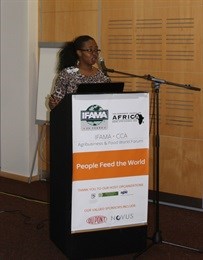IFAMA's Academic Symposium summary
The Agribusiness & Food World Forum is underway after opening with a summary of the scientific research symposium on Monday, 16 June.
![[Agribusiness & Food World Forum] IFAMA's Academic Symposium summary](https://biz-file.com/c/1406/205058.jpg)
More than 150 papers relevant to food and agribusiness were delivered by international and South African academics, economists and other experts in their fields on a remarkable range of topics. These included African Agribusiness, Markets and the Economy, Value Chain Development in African Agribusiness, Trade, Human Capital, Institutions and Policy, Sustainable Development, Food Security, Marketing, Post-Harvest Management, Livestock and Animal Treatment and many other related topics.
This event provided speakers with a significant showcasing opportunity for international exposure. The papers presented at the Academic Symposium were those chosen by IFAMA from the wide range of submissions received from international universities and other relevant institutions that were invited to submit academic papers of the event. Consequently, the speakers represented were from universities and institutions across the globe and the topics and geographic location of the studies were equally diverse. The forums for different topics were held concurrently in six meeting rooms with four sessions throughout the day.
In the trade forum

Masego Moobi from the South African National Agricultural Marketing Council
The first presentation was by Masego Moobi from the South African National Agricultural Marketing Council, who presented a paper jointly compiled with her NAMC colleague Sifiso Ntombela on South Africa's agricultural export competitiveness in the BRIC (Brazil, Russia, India and China) market for selected products. She explained that although South African exports to the EU had declined over the past decade from 39% to 30%, South African trade to BRICS countries had increased by 753% during the same period. Her conclusion was that while South Africa's competitiveness was rapidly increasing, this process needed to be continued and intensified in order to make South Africa competitive within the BRIC countries.
Kateryna Schroeder from the University of Missouri, Columbia USA presented a cross country comparison of wheat markets in Argentina and Ukraine, two of the top ten global wheat producing countries. One of her conclusions was that government intervention created price volatility and had a direct effect on the long-term stability of prices in both these countries.
In the food security forum
Ram N. Acharya from New Mexico State University, USA, presented a paper on food security and its impact on human health in sub-Saharan Africa. The study was conducted in Tanzania and the paper examined the causes of wasting, stunting and underweight caused by food insecurity in the country. Luc D'haese from the University of Ghent in Belgium delivered a paper on the link between agribusiness and rural household security in Limpopo. His evidence revealed that out of a general population sample of 100 (all ages included) only 18 were employed and that for many people rely on grants or gifts for up to 50% of their income.
In the African agribusiness forum
Frank Nyekyeku Nti from the Kansas State University, USA presented a paper entitled The Economic Development and Energy Needs System: A Simulation of Alternative Futures for Ghana. He outlined the energy growth needs for Ghana and the challenges to development presented by the current limited an unreliable electricity supply. He presented a proposal of how the country could supplement this with alternative renewable energy as Ghana had the required natural resources to provide solar, hydro and wind energy.